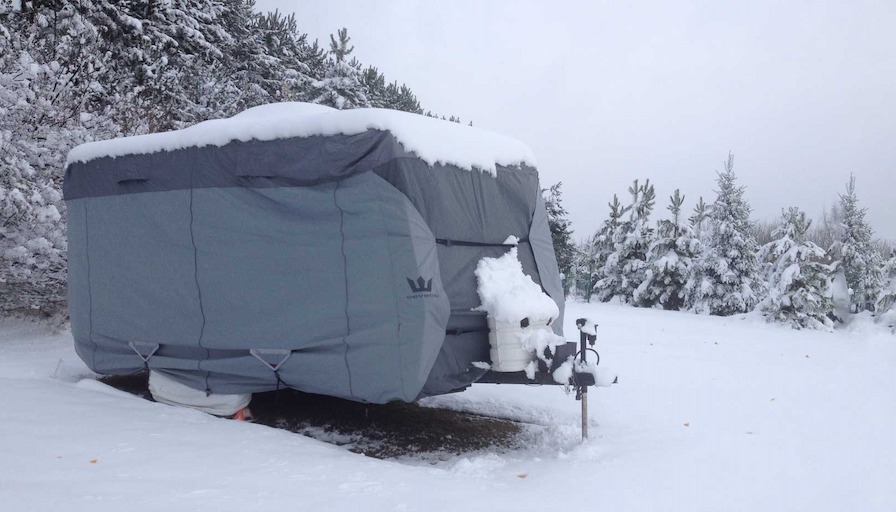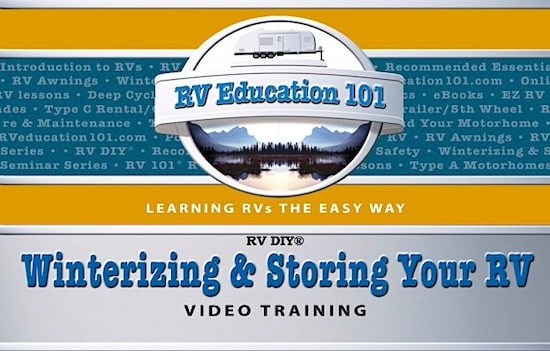Thanks for your support! If you make a purchase using our links in this article, we may make a commission. And, as an Amazon Associate, I earn from qualifying purchases. See the full disclosure here.
Updated April 12, 2024
We bought our 2008 Class C RV from a private owner, and he did not winterize the RV. We discovered this when water began pouring out from under the dinette booth on our shakedown trip. The culprit was a cracked water pump caused by a lack of winterization.
So when people ask if they have to winterize their RV, my answer is always YES!
When the weather begins to turn cool, the RVing season winds down for most of us. During the fall, preparing your RV for the harsh winter months is wise. Winterizing and protecting your RV or camper from the elements is a critical part of protecting your investment.
Everyone has heard horror stories of the damage that can be done by freezing pipes in RVs and campers. However, taking the proper steps to drain your lines and protect your RV from damage will be well worth it. This process is known as winterization.
Why You Need to Winterize Your RV or Camper
If you do not protect your RV and its plumbing system, water left inside your pipes or tanks can freeze when temperatures dip below freezing. When water freezes, it expands and can cause significant damage to your pipes, tanks, and fittings.
Winterizing your camper is highly recommended to protect your precious investment. If you live in an area where the temperature dips below 32 degrees Fahrenheit at any point during the winter, it is best to winterize your RV.
If you live in areas where freezing temperatures are rare or unlikely, you may not need to winterize your RV. However, it is wise to take action in advance if there is any chance of cold temperatures. It is also a good idea to thoroughly inspect your RV as you winterize to ensure it is in good condition before storing it until next season.
Can You Use Your RV After It Has Been Winterized?
In most cases, you can continue using your RV after you winterize it. Of course, there are certain steps you can no longer take, such as putting food-safe anti-freeze in your lines, unless you have another source of water. If the temperatures are low enough, you’ll have to keep your tanks warm and water moving through the pipes.
If your RV is a four-season RV, you only need to ensure you’re stocked up on propane and water. This is true even if you’re on shore power. Shore power is just like power in a home and is subject to going out in a nasty storm or the various incidents that cause temporary power outages.
You should also have an RV skirt, plenty of Reflectix (if applicable), and a skylight insulator (again, if you feel it’s necessary to bolster the internal temps).
How Cold Can It Get Before I Have to Winterize My RV or Camper?
If the temperature drops below 32 degrees Fahrenheit at any time, you risk having water freeze in your pipes, tanks, or water heater. This could potentially cause severe damage to your RV.
While some folks think it is okay to wait to winterize your RV or camper until you have a full 24 hours with temperatures below 32 degrees Fahrenheit, you could have damage from even a few hours with temperatures below freezing.
To be on the safe side, it is best to winterize your camper before temperatures of 32 degrees Fahrenheit or below are forecast for your area.
What Happens if You Don’t Winterize Your RV or Camper?
If you choose not to winterize your RV and temperatures fall below 32 degrees Fahrenheit, you run the risk of severe damage to your RV.
When temperatures fall below the freezing point of 32 degrees Fahrenheit, water freezes. When water freezes, it expands, and this expansion can cause significant damage to your pipes, tanks, and fittings. Pipes and fittings can break, tanks can crack, and your entire plumbing system could be damaged.
Many people think that they can simply drain all of the water out of their lines instead of doing a full winterizing process on their RVs. However, there are many places inside your RV where water can pool and sit, even if you drain the lines. If this water freezes, you will have a problem.
The best way to avoid these issues is to winterize your RV. If you live in an area where the temperature dips below 32 degrees Fahrenheit at any point during the winter, you seriously need to consider winterizing your rig.
If you do not want to do it yourself, you can always have an RV service center take care of this process for you. The cost of winterizing, even when done by professionals, is much less than the cost of repairing damaged pipes and tanks.
Do I Need to Winterize My RV or Camper if it is Plugged In All Winter?
If your camper is connected to power all winter, you may wonder if it is necessary to winterize at all. Remember that the main reason to winterize is to protect your pipes and tanks from damage due to bursting pipes. Pipes can burst any time temperatures dip below freezing, whether your camper is plugged in or not.
Having your camper plugged in does not offer protection from low temperatures. While you could run your heater to keep temperatures warm in your camper, this comes at a cost. Overall it is best to winterize your RV even if you plan to keep it plugged in throughout the winter months.
Do You Need To Remove RV Batteries In The Winter?
With a few exceptions, you should generally remove your RV batteries in the winter. However, if you spend an entire day walking through a campground and asking random RVers this question, you won’t get the same answer most of the time. It really depends on your location.
There’s no doubt that cold temperatures negatively impact batteries. However, the cold temperature in Minnesota isn’t the same as in New Orleans or Miami. The biggest impactors on batteries are over- and under-charging rather than winter temperatures.
First, determine your brand and type of battery, then look up the manufacturer’s recommendations on temperature tolerances. Lithium batteries are generally good to go throughout winter storage and don’t need to be removed. Depending on your storage setup, a trickle charge over the winter months can be harmful, as it results in overcharging.
How Much Does It Cost to Winterize an RV or Camper?
If you do not have the time or desire to winterize your RV yourself, you can have someone do this for you. Most RV dealers and service centers offer winterizing services, so it should not be hard to find a place to have this service done.
The price of winterizing your RV will vary based on several factors. Your location, the service center you choose, and the size and style of your RV will impact the cost. The cost of winterizing a Class A motorhome ranges from $250 to $300. The price will be a little bit less for a Class B or C camper. Expect to pay anywhere from $200 to $250 for this service.
One important thing to keep in mind if you plan to have someone else winterize your RV is that you will need to schedule this service month in advance. All RVers winterize their rigs around the same time, which means that demand for this service is high during the late fall and early winter months.
Fall and early winter are also busy times for RV service centers in general, as many people prefer to get maintenance done on their RVs during the colder months when they are not traveling. For these reasons, you will need to schedule the service ahead of time and be sure not to wait until the last minute.
How Do I Winterize an RV or Camper?
Winterizing your RV for the first time is not as difficult as you think. Before you get started, be sure to check out your RV owner’s manual for any specific steps or procedures needed for your rig.
Next, you will need to assemble the materials needed to winterize your RV.
- Non-Toxic Antifreeze – How much you will need depends on your plumbing lines. Most people will need around three to five gallons. Buy it early! It sells out fast!
- A wand to clean out your holding tanks if you do not have a built-in flushing system
- A water heater bypass kit, if you do not already have one installed.
- Basic tools to remove your drain plugs
- A water pump converter kit to connect to the inlet side of the water pump
1. Remove any Inline Water Filters
The chemicals that you will use to winterize your RV can damage water filters. For this reason, you will need to be sure to remove them before beginning winterization.
If you have an inline filter for your faucet, check for the bypass hose you can use when the filter is removed.
While you have your filters removed, this is a great time to check them out to see if they need to be replaced with new ones.
2. Drain Your Tanks
All of your tanks- fresh, black, and gray- will need to be drained before adding antifreeze to your RV. Start with the fresh water tank and make sure it is empty. Next, drain and flush your gray and black water tanks. Make sure that you are draining them at an approved RV dumping station. After draining your tanks, clean them with an RV flushing wand. You may not need to use an RV wand if your camper has a built-in flushing system.
3. Drain Your Water Heater and Water Lines
Once you have drained your tanks, it is time to tackle the water heater and water lines. It is important to note that you will need to turn off your water heater and let it cool down and depressurize before attempting to drain it. Do not drain the water heater tank before doing this!
Once you have allowed time for the water heater to cool and depressurize, remove the drain plug, and open the pressure relief valve.
Next, open all of your faucets in the RV, both hot and cold, to allow them to drain. You will need to drain your outside shower line if you have one as well. Don’t forget your toilet valve! You can use your water pump to do this. Just be sure to shut it off as soon as everything is drained. When you are finished, recap all drains and close the faucets.
4. Bypass Your Water Heater
Before adding antifreeze to your camper, you must bypass the water heater. Bypassing the water heater prevents antifreeze from getting into your water heater. Some RVs come with a bypass. If your RV does not have a water heater bypass, you will need to install a bypass kit. You can also have this done at an RV service center.
5. Add Antifreeze to Your RV
You will need to do one of two things to get antifreeze into your RV system. You can install a water pump converter kit or disconnect the inlet side of your water pump and connect clear tubing. You can then put the other end of the tube into your container antifreeze.
The next step is to turn on your water pump and pressurize the system. The water pump will take antifreeze throughout your RV water system. After you turn on the pump, walk through your camper and turn on the faucets.
Start with the closest faucet, and slowly open the hot and cold valves until you see antifreeze. You may need to replace the antifreeze container as you work your way through your rig. Don’t forget to do your outdoor shower and flush the toilet as well. You will need to flush until the antifreeze appears.
Finally, pour a cup of antifreeze down your drains and the toilet. Flush the antifreeze into the holding tank. Make sure all faucets are closed, and you are done!
What Works Best For Keeping Pests Out Of An RV?
What works best for keeping pests out of an RV depends on the type of pests. However, there are some things you can do that will naturally repel unwanted critters while aligning with your preventative maintenance routines.
- Make sure your RV stays clean, inside and out
- Keep pantries clean of exposed dry goods and properly store your food
- Maintain a low humidity within, unless low humidity creates a health issue for you or your family
- Make sure your windows or other openings have screens
- Routinely inspect your RV to ensure the integrity of your seals
- Fill in any unseen gaps with steel wool (rats and mice), caulking, or expandable foam
- For natural prevention, peppermint essential oil and diatomaceous earth are your best friends
Lastly, if nothing you do seems to be working, contact a professional pet control agency and have someone come out. Some things can get out of hand faster than you can control.
For instance, a single female German cockroach can lay 12 to 15 oothecae (egg sacks full of roughly 30 eggs) per year, with the hatching roaches reaching maturity quickly. Imagine what several females with another 35 to 40 females on the way can do.
Final Words About Winterizing An RV
Whether you winterize yourself or have it done at a service center, winterizing your RV is a smart choice. Winterizing protects your investment and gives you peace of mind. No matter how low the temperatures drop, your RV is safe from water damage with proper winterization. Now you can kick back, relax, and start planning your spring camping adventures!
And in the spring when it’s time to de-winterize your RV check out this handy checklist!
Related Reading:
– Should I Leave My RV Plugged in All Winter?
– The Pros and Cons of RV or Camper Covers
– 10 Steps to Properly Store Your RV for Winter Without Doing Damage
– How Cold Does it Have to Get Before RV Pipes and Tanks Freeze?
– How to Winterize a Tankless RV Water Heater
Mike Scarpignato – Bio
Mike Scarpignato created RVBlogger.com over five years ago in 2018 to share all we have learned about RV camping.
Mike is an avid outdoorsman with decades of experience tent camping and traveling in his 2008 Gulf Stream Conquest Class C RV and 2021 Thor Challenger Class A motorhome.
We attend RV Shows and visit RV dealerships all across the country to tour and review drivable motorhomes and towable trailers to provide the best evaluations of these RVs in our blog articles and YouTube videos.
We are 3/4-time RVers who created RVBlogger.com to provide helpful information about all kinds of RVs and related products, gear, camping memberships, tips, hacks and advice.




We slept in our camper several times over the summer, but never used any water in the lines. We were at a relatives home so we used their restrooms & they cooked. Do we still need to winterize even though no water is in any lines since last years winterization?
What’s with an arctic package. Are they good enough to use without winterizing?
We use our motorhome off and on year round. Typically before we got this one we winterized and just used bottled water when winter camping but would like not to have to do that all the time. We live in Arkansas where it’s not freezing all the time.
Ok, to CONFIRM, winterize the RV if you’re going to be storing it over the winter months.
BUT, if you LIVE in it full time, this is NOT necessary, RIGHT???
Thanx!
Cliff
Texas
I just bought my RV new do I still need to winterize it. It’s never been used
Hi Zola,
Yes, you still have to winterize your RV unless it was already winterized by the dealership.
Mike